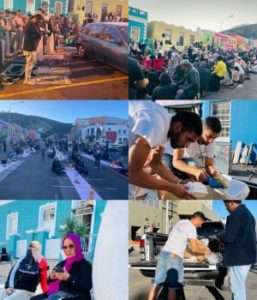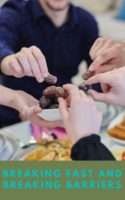As a young Black man from the Eastern Cape, I have always been curious about the customs and traditions of different cultures, especially during religious holidays. So hen I received an invitation to attend a public iftar, I jumped at the chance to learn more about this important Muslim tradition, in Bo-Kaap.
The Auwal Mosque, constructed in 1794 and the oldest mosque in South Africa, hosted the iftar. I was struck by the diverse group of people who gathered to break their fast together. Muslims, non-Muslims, young and old, all hustling and bustling to get everything ready for the iftar/ evening meal. Iftar is the meal eaten by Muslim people after sun has set during Ramadan, to mark the end of the day’s fast.
When the sun set, everyone broke their fast by eating three dates, followed by the call to prayer. The call to prayer came, and the crowd fell silent and readied their prayer mats facing the Qibla, which is the direction of the Ka’bah in the Grand Mosque in Makkah, Saudi Arabia. It’s the direction which all Muslims face when performing their prayers, wherever they are in the world. After the prayer, we all went back to eating and socialising.

I spoke with Safwaan Loubsher, one of the lead organizers of the public iftar, who explained that the event was started as a protest against the gentrification in their community. “The Iftar was initially started as a protest against the gentrification we see in our community,” said Loubsher.The Bo-Kaap Youth Movement, which organised the iftar, aims to unite the community and preserve their cultural traditions that are in danger of disappearing as rich people buy up the quaint houses, so pushing up property prices and making the area unaffordable.
Bo-Kaap has a rich history and is home to the Circle of Kramats, a shrine of Muslim holy men buried in Cape Town. The Bo-Kaap Youth Movement is fighting to preserve the community’s culture, known for its brightly coloured homes and cobblestone streets, but it is so much more than that. It is warm and welcoming that I have experienced first-hand now. It is a multicultural community, and most of its members practice Islam. The Bo-Kaap Youth Movement does not want gentrification to that away from them.
The Iftar is a symbol of unity and community. “We want to unite all of Mzansi. Even you now, you are one of us,” says Yaseen, a member of the Bo-Kaap Youth Movement.
I witnessed individuals from diverse backgrounds joyfully engaging in communal sharing of food. During the event, I conversed with a couple who were on vacation from Mombasa, Kenya. They had stumbled upon the festivities in Bo-Kaap without prior knowledge. The couple informed me that a similar gathering takes place in their hometown, but with some differences. In their community, individuals do not arrive with prepared food; they sit at separate tables, cook the food together, and share it piping hot. They also mentioned that this custom is rooted in Muslim tradition.
Attending a public iftar in Bo-Kaap allowed me to experience firsthand the warmth and welcoming spirit of a multicultural community united by the Muslim tradition of breaking fast during Ramadan. The Iftar not only serves as a symbol of unity and community, but it also serves as a means of preserving the culture of the Bo-Kaap community against the encroaching forces of gentrification. As the word spreads, we hope this tradition of unity and cultural preservation will extend beyond the borders of South Africa and throughout the entire African continent.
Tell us: What are your thoughts on attending public iftars or other religious traditions outside your culture? Have you ever participated in such an event, and if so, what did you take away from the experience?
If you enjoyed this you might like Your surname of mine? here



